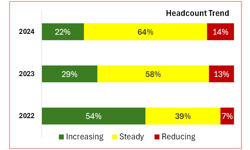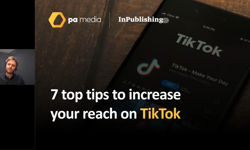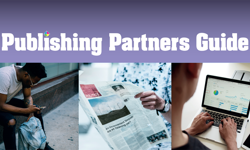
Q: As we start to emerge from lockdown, what should publishers be doing now to take full advantage?
A:
This is an important time for publishers to be looking at their product portfolio, data and their supply chain.Many products they produce – in print, digital or live – may need a thorough review and there may be huge opportunity to research and launch new products into their markets. The supply chain is under pressure.
In terms of data, publishers need to understand their audiences better, what their needs are, their challenges and to identify how they can adapt and create products to support them. They also need to understand the universe in which they operate and identify where the gaps are, which is especially important now following the impact the pandemic has had on publishing businesses with unprecedented levels of redundancies.
For the supply chain, costs are likely to increase due to pressures their suppliers face including potential / actual rises in paper, post and transport prices. Identifying new suppliers that can compete on service, price and delivery will be important to publishers and tendering could be an option here to see where they can improve their bottom line.
Q: What have been the key lessons for publishers from the pandemic?
A:
The first lesson, I would say, is discovering or re-enforcing how resilient and adaptable their teams are in a crisis. Covid had a significant impact on the publishing sector with an immediate need to deliver more with less, at pace and digitally and publishing professionals met these challenges head on to ensure their businesses survived and, in many cases, thrived.The pandemic highlighted the need for publishers to have a diverse product portfolio with digital first at the heart of this. Those publishers who were reliant on print or events pre-pandemic were certainly affected a great deal more than those who had a better balance across these channels and operating across a range of market sectors.
Never be complacent because you never know what might be around the corner and always have a plan B. Remote working will most likely become commonplace but constantly reviewing systems, processes and tech to ensure they are robust and ready for all eventualities is essential alongside having a crisis management plan to deal with any future outbreaks.
Make sure you have a network of support partners and innovative suppliers who will also rise to the challenge and adapt when needed.
Q: Which publishing revenue streams do you expect to see most growth in the future, and why?
A:
Growth areas for revenue will vary from publisher to publisher but understanding audiences and communities to identify needs and challenges will be key.Monetising content through paid-for subscriptions / membership is going to be big business for many publishers. The main challenge and barrier to adoption will be understanding how to do this without losing your audience but there are already some great case studies of businesses who have taken the leap and are now benefitting financially from this.
Building and monetising communities will also be a key growth area providing publishers with opportunities to generate recurring revenues.
Digital revenues will continue to be a focus with an emphasis on developing video and podcast products and opportunities for advertisers and sponsors alongside a further growth in sponsor led webinars.
Virtual events served most publishers well over the last 12+ months but driving revenue was challenging. This was largely because the opportunities to network were weak and incomparable to a live in-person event. Therefore, in-person events, which benefit all audiences (readers, advertisers and sponsors) will be an important channel for growth but with hybrid being an additional opportunity to drive revenues before (pre-event webinars), during (live streaming) and after (on-demand access).
And new streams for many, in-combination with building communities, may include the move into online learning and training within their specific markets.
Q: How do you see the publishing industry developing over the next few years?
A:
News and up-to-the minute information will remain essential for many publishers but, equally, many will move away to focus on deeper and more exclusive content that harnesses time and loyalty from their audiences and ultimately can be monetised through paid subscriptions or memberships.365 communities will be the norm.
The demand for training and knowledge is at an all-time high, so we see this as being a new area of focus for many publishers.
Content marketing opportunities will continue to flourish and develop as advertisers and sponsors demand more opportunities for thought leadership. The development of events, video, podcasts and research opportunities and products will be important channels to satisfy this need.
More targeted communication packages will also be key as audiences and advertisers become more demanding and technology develops to provide new ways to engage.
Print and digital magazines will still be important in many markets but will need to adapt to survive.
The sector will become more analytical not only in terms of how it identifies content needs but also the performance of the content from an engagement perspective.
Great progress will be made but diversity and mental health will continue to be important topics on the corporate agenda for all publishing businesses.
Q: In terms of digital transition, where do publishers need to focus their energies?
A:
Content as they say is 'King' but with so much content available online that is easy to access and quite often the same, it will be important for publishers to differentiate themselves from their competitors through their content offering.Publishers will therefore need to determine what their audiences need and then serve those needs accordingly but we expect for many the focus will be on providing a balance of short form news with exclusive, high quality, long form content, which will drive interest, engagement and loyalty and ultimately can be monetised.
And this all comes down to understanding their audiences and what their needs and challenges are.
Complementing this is the need for an excellent user experience through the sales / marketing funnel and at all touch points.
Publishers also need to review their product portfolios to ensure they are maximising the opportunities that digital provides to both reader and advertiser.
And finally, investment in training across all major functions and particularly for publishers transitioning from a traditional print focused business. The learning curve is steep but as the pandemic has shown, publishing professionals are highly adaptable and will embrace this new era for publishing.
Q: For people attending events like The Publishing Show, what tips would you give them to help them get the most out of their visit?
A:
Come with an open mind, a commitment to exploring and a willingness to learn and see things differently. You never know who you might meet or what you might see but if you don’t embrace the event, you won’t see these opportunities.Events should inform, inspire and help you connect with your peers, partners and suppliers. But you will only get out of it what you put in. So, plan your day in advance and then come along and walk the floor, speak to exhibitors, listen to seminars and talk to people – you’ll be amazed what you come away with.
About The Publishing Show

Whether you work for a small B2C independent publisher, a membership organisation, or a large B2B media and information business, there is great value in listening to your peers, says Mash Media. The challenges they have faced. The innovations from their teams. How their audiences and advertisers have adapted to a world lived online and remotely. And what the future holds.
The Publishing Show, taking place on 22-23 June at ExCeL London is packed full of case studies and panel discussions designed to give delegates a rapid review of what has been learned in the last year. To inspire them to rethink their own media business. And provide practical tips on the hottest issues in the industry. There’s also an exhibition of leading suppliers, a networking lounge and their delegate pass will also give them free access to International Confex, which is running alongside.
Register now. Free places are available. But for the full content experience, you'll need a one/two-day delegate pass. 20% discount using code InPub20.










